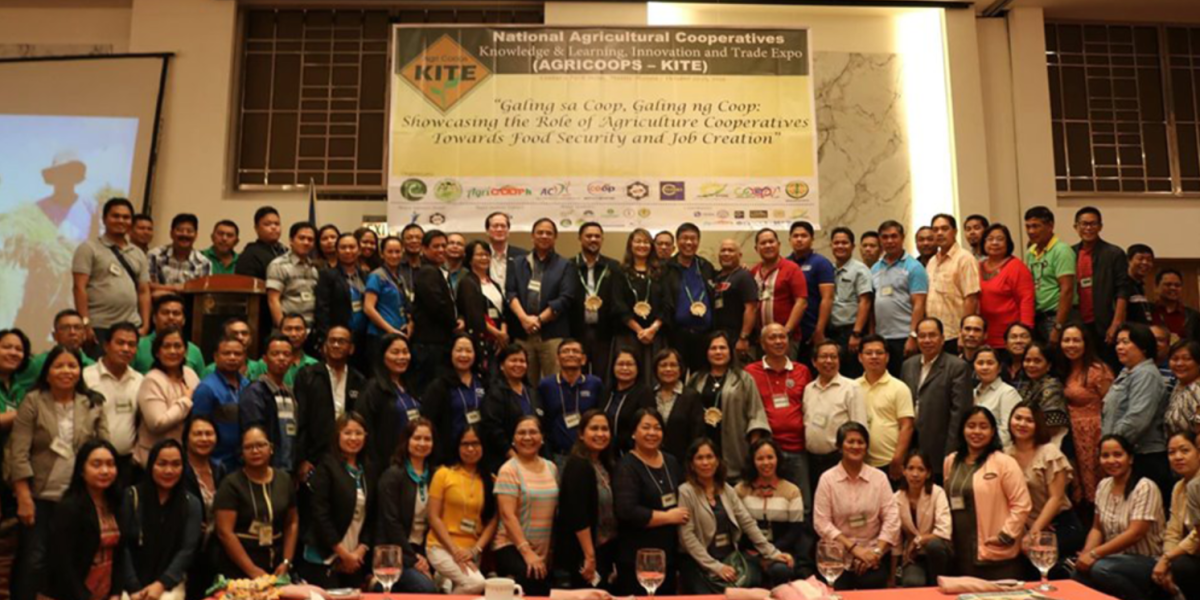Co-op leaders pledge to redeem agriculture
MANILA –120 co-op leaders from credit, multi-purpose and agricultural co-operatives pledged to redeem Philippine agriculture at the National Agricultural Cooperatives Knowledge & Learning, Innovation and Trade Expo (AgriCoops KITE) held at the Century Park Hotel on October 22 – 25.
Among the co-signatories were co-op federations such as the National Confederation of Cooperatives (NATCCO), Nueva Segovia Consortium of Cooperatives based in Ilocos Sur, and non-government organizations (NGOs) like Pakisama.
In a Manifesto, the participants agreed that Agriculture is a significant portion of the country’s Gross Domestic Product, and is therefore one of the key industries in the country that ensures food on every table.
The co-op leaders also decried that “Filipino farmers are heroes who feed Filipinos, investing in rural areas, and yet they are mostly unorganized are always left behind because they alone face the risks and bear the losses.”
On their being unorganized, the Manifesto added: “Agri-based cooperatives nationwide have 328,000 members, thus important for them to be mobilized, but their production is too small and scattered to meet large orders.
Furthermore, because they are disorganized, farmers are at the mercy of big business and middlemen who dictate farmgate prices.
To correct the situation or farmers and agriculture, the Manifesto declared: “A good model to follow are the European countries where agriculture and other key industries like banking and insurance are led by agri co-ops.”
So to uplift farmers and their families, increase food security and production, make available affordable and nutritious food, and protect the environment, the participants agreed co-ops should “unite and increase participation in the value chain that will integrate the entire Agriculture industry.”
A general blueprint and roadmap was also contained in the Manifesto: “the complete integration of agriculture from the provision and training of agriculture business development service and extension, financing, acquisition and supply of farm inputs, all the way to production, harvesting, post-harvest warehousing and transporting, food processing, packaging, distribution and retailing.”
While agricultural and agrarian reform co-ops will be on the production side, expected to finance the big undertaking will be the primary co-operatives, federations, unions and NGOs “working together to identify agricultural clusters and then aggregate the farmers’ products.”
The event also conducted a sales expo at the nearby Harrison Plaza mall, where co-ops displayed their products. “The idea here is to aggregate. For instance, there are many co-ops producing coffee on a small scale and they cannot meet the large supply requirements of buyers. So they are forced to sell to small-scale buyers at lower prices. We will identify agri clusters, allow small farmers to combine their produce, become large-scale suppliers and command higher prices.”
One of the objectives is also to create the “CO-OP” brand which stands “for premium quality, love for the environment, and prosperity for all – from producers to consumers – and care for the environment.”
“Aggregating the products of agri co-ops all over the country is obviously a very ambitious undertaking,” says Paez. Thus, the Manifesto urges co-op leaders to “govern their organizations well, serve their members in the best possible way, grow their co-ops, and make the value chain a reality by funding or investing in agriculture, and push for alternative executive and legislative agenda that would support agri co-ops.”
The Manifesto also lists requests to specific government agencies on how to make the aggregation and integration of Philippine agriculture a reality.

